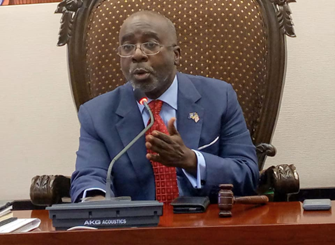The unfolding political drama within Liberia’s House of Representatives has reached a fever pitch, marked by a blatant disregard for legal processes and a desperate scramble for power. Majority lawmakers, seemingly emboldened by executive branch support, forcibly entered the offices of embattled Speaker J. Fonati Koffa, an act that underscores a disturbing trend of lawlessness and a prioritization of personal gain over constitutional principles. This forceful takeover, executed without a court warrant, stands in stark contrast to the lawmakers’ sworn duty to uphold the rule of law and respect the very constitution they are entrusted to protect. Their actions not only violate established legal procedures but also erode public trust in the integrity of the legislative process, sending a dangerous message that power trumps principle in Liberian politics.
The justification offered by Representative James Kolleh, the House chair on rules, order, and administration appointed by the majority bloc, hinges on the claim that prior written communications to Speaker Koffa requesting the handover of the office had gone unanswered. However, this explanation sidesteps the crucial legal question of whether forcibly entering the office with armed police officers, absent a court warrant, constitutes a lawful action. This disregard for due process raises serious concerns about the majority bloc’s commitment to the principles of justice and fairness, suggesting that expediency and political maneuvering have superseded their obligation to adhere to legal norms. The incident highlights a growing tendency to circumvent established procedures in pursuit of political objectives, a dangerous precedent that threatens to undermine the very foundation of Liberia’s democratic institutions.
The Supreme Court of Liberia’s recent opinion, declaring the actions of both parties in the House leadership struggle as “ultra vires,” or beyond their legal authority, further underscores the precarious legal ground on which the majority bloc stands. Despite this clear legal guidance, their insistent pursuit of installing their chosen Speaker, Richard Nagbe Koon, reveals a troubling disregard for the highest court’s authority. This defiance not only exacerbates the ongoing political crisis but also sets a dangerous example of selective adherence to the law, where compliance is contingent upon alignment with political agendas. The majority bloc’s actions signal a willingness to manipulate legal processes to achieve desired outcomes, a practice that threatens to erode the integrity and impartiality of the judiciary and undermine the rule of law.
Embattled Speaker Koffa’s prediction that he might be forcibly removed from office, echoing the manner in which the new Speaker was elected while he still holds the legitimate title, highlights the volatile and unpredictable nature of the current political climate. This precarious situation raises profound questions about the future of democratic governance in Liberia. The disregard for legal procedures and the open defiance of the Supreme Court’s ruling paint a concerning picture of a political system increasingly characterized by power struggles and a lack of respect for established institutions. The current crisis risks jeopardizing the stability and legitimacy of the government, eroding public trust and potentially triggering further political instability.
The actions of the majority bloc have sparked widespread concern and disbelief among Liberians, who question whether the nation is governed by the rule of law or by the whims of individuals driven by personal ambition and a thirst for power. The blatant disregard for constitutional principles raises fundamental questions about the future direction of the country and the commitment of its leaders to democratic ideals. The incident serves as a stark reminder of the fragility of democratic institutions and the constant vigilance required to protect them from those who would prioritize personal gain over the welfare of the nation. The erosion of public trust in the integrity of the legislative process is a serious consequence of this power struggle, potentially leading to disillusionment and disengagement from the political process.
The apparent indifference of the majority bloc to the Supreme Court’s distancing itself from the House’s internal conflicts raises further concerns about their commitment to judicial independence and the separation of powers. The judiciary’s decision to maintain a distance sends a clear message of disapproval and underscores the gravity of the situation. The majority bloc’s seeming disregard for this message raises questions about their understanding of the importance of a balanced and independent judiciary in a functioning democracy. Their actions suggest a willingness to undermine the checks and balances that are essential for preventing the abuse of power and ensuring accountability within the government. The long-term consequences of this erosion of institutional integrity could be far-reaching, potentially damaging Liberia’s democratic foundations and hindering its progress towards a more stable and just society. The current political crisis serves as a crucial test of Liberia’s commitment to democratic principles and the rule of law, demanding a decisive response from all stakeholders to restore public trust and ensure the proper functioning of its democratic institutions.


